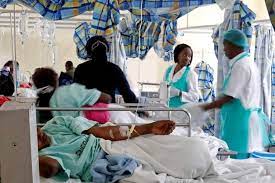PAG Felicitates Muslims on Commencement of Ramadan Fast
February 18, 2026TOP TEN MUSLIM UNIVERSITIES IN AFRICA
February 14, 2026ANALYSIS: Why Nigeria GDP is not the best in Africa Despite having the largest market
February 10, 2026NCDC Declares Cholera Crisis, Sets Up Emergency Measures
NCDC Declares Cholera Crisis, Sets Up Emergency Measures

The Nigeria Centre for Disease Control and Prevention, NCDC, yesterday activated a national cholera emergency centre, following the outbreak of the disease in the country.
It also said 53 deaths and 1,528 suspected cholera cases were recorded across 31 states and 107 local government areas, with a case fatality rate of 3.5 per cent since the beginning of 2024.
This is even as Lagos State government yesterday disclosed that the cholera death toll had risen to 29 from the previously reported 24 last week, adding that the total number of suspected cases had risen to 579.
Director-General of NCDC, Dr Jide Idris, who spoke in an update on the cholera epidemiological situation in Nigeria yesterday, expressed fears that the situation might be compounded as the rainy season intensifies.
As part of ongoing prevention and response efforts at the national and sub-national levels, Idris assured that a National Cholera Emergency Operation Centre has been activated.
“Cholera, a highly contagious food and water-borne disease, has in the recent past reared its devastating head in several states across our country. It is caused by the ingestion of the bacterium, Vibrio cholerae in contaminated water and food.
“As of 24th June 2024, 1,528 suspected cases and 53 deaths have been recorded across 31 states and 107 local government areas with a case fatality rate of 3.5 per cent since the beginning of the year.
“These fatalities are not just statistics but a significant loss of a loved family member, a spouse, a parent, and often a seasoned healthcare worker and team member. This situation may be compounded as the rainy season intensifies,” Idris said.
He expressed regrets that the country is facing another public health emergency as it was just coming out of the Lassa fever and meningitis outbreaks.
In response to the rapidly increasing cholera cases, a dynamic risk assessment was conducted by subject matter experts on cholera outbreak situation in Nigeria last week.”“The subject matter experts were drawn from relevant ministries (health, environment, agriculture, water resources etc.), departments, agencies, stakeholders, and major partners.
“The outcome of the risk assessment placed the country at ‘high risk’ of cholera transmission and impact. This demands our immediate and coordinated actions and, therefore, necessitated the activation of the National Cholera Multi-Sectoral Emergency Operations Centre, EOC, in Nigeria today.
“The decision to activate the Cholera Emergency Operation Centre underscores the gravity of the situation and our unwavering commitment to protect the health and well-being of every Nigerian,” he said.
Idris described the Emergency Operation Centre as the central hub for coordinating the nationwide response, noting that it would support affected states, speed up communication and data analysis, and help with decision-making.
“Additionally, it will mobilize resources and expertise from the NCDC, our partners, and all levels of government.
“ It will ensure efficient deployment of needed resources, strengthen surveillance and diagnostic capacity and capabilities, enhance case management, training and intensify public awareness and community engagement activities.
“To effectively do this, an Incident Manager has also been appointed, who will coordinate the day-to-day activities involving several pillars such as surveillance (data collection, analysis and dissemination), case management, oral cholera vaccine issues, coordination, infection prevention & control, IPC, logistics support, and research,’’ he said.
The NCDC boss explained that before activating the EOC, the NCDC, working through the National Cholera Technical Working Group, had already taken preventative and responsive actions, including pre-positioning and distributing medical supplies for case management, infection prevention and control, and laboratory diagnosis to all 36 states and the Federal Capital Territory, FCT.
He sympathized with the families and friends who have lost their loved ones to the outbreak, just as he acknowledged the efforts of all stakeholders, including ministries departments and agencies, MDAs, state and local governments, local and international partners, healthcare workers, community leaders, and individuals that have worked hard in responding to this outbreak.
END.








